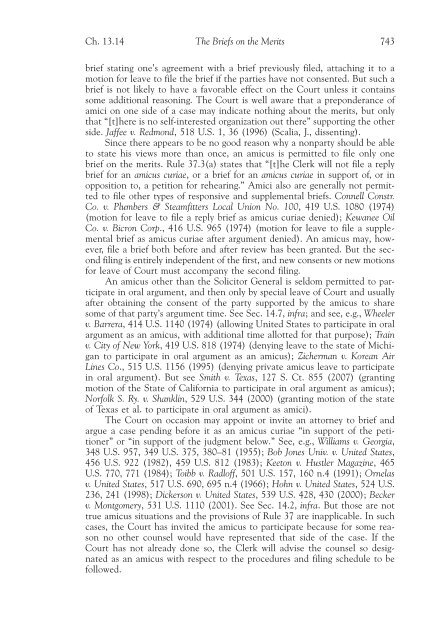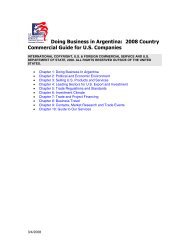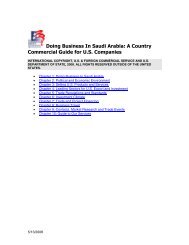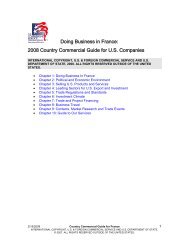Create successful ePaper yourself
Turn your PDF publications into a flip-book with our unique Google optimized e-Paper software.
Ch. 13.14 <str<strong>on</strong>g>The</str<strong>on</strong>g> <str<strong>on</strong>g>Briefs</str<strong>on</strong>g> <strong>on</strong> <strong>the</strong> <strong>Merits</strong> 743<br />
brief stating <strong>on</strong>e’s agreement with a brief previously filed, attaching it to a<br />
moti<strong>on</strong> for leave to file <strong>the</strong> brief if <strong>the</strong> parties have not c<strong>on</strong>sented. But such a<br />
brief is not likely to have a favorable effect <strong>on</strong> <strong>the</strong> Court unless it c<strong>on</strong>tains<br />
some additi<strong>on</strong>al reas<strong>on</strong>ing. <str<strong>on</strong>g>The</str<strong>on</strong>g> Court is well aware that a prep<strong>on</strong>derance of<br />
amici <strong>on</strong> <strong>on</strong>e side of a case may indicate nothing about <strong>the</strong> merits, but <strong>on</strong>ly<br />
that “[t]here is no self-interested organizati<strong>on</strong> out <strong>the</strong>re” supporting <strong>the</strong> o<strong>the</strong>r<br />
side. Jaffee v. Redm<strong>on</strong>d, 518 U.S. 1, 36 (1996) (Scalia, J., dissenting).<br />
Since <strong>the</strong>re appears to be no good reas<strong>on</strong> why a n<strong>on</strong>party should be able<br />
to state his views more than <strong>on</strong>ce, an amicus is permitted to file <strong>on</strong>ly <strong>on</strong>e<br />
brief <strong>on</strong> <strong>the</strong> merits. Rule 37.3(a) states that “[t]he Clerk will not file a reply<br />
brief for an amicus curiae, or a brief for an amicus curiae in support of, or in<br />
oppositi<strong>on</strong> to, a petiti<strong>on</strong> for rehearing.” Amici also are generally not permitted<br />
to file o<strong>the</strong>r types of resp<strong>on</strong>sive and supplemental briefs. C<strong>on</strong>nell C<strong>on</strong>str.<br />
Co. v. Plumbers & Steamfitters Local Uni<strong>on</strong> No. 100, 419 U.S. 1080 (1974)<br />
(moti<strong>on</strong> for leave to file a reply brief as amicus curiae denied); Kewanee Oil<br />
Co. v. Bicr<strong>on</strong> Corp., 416 U.S. 965 (1974) (moti<strong>on</strong> for leave to file a supplemental<br />
brief as amicus curiae after argument denied). An amicus may, however,<br />
file a brief both before and after review has been granted. But <strong>the</strong> sec<strong>on</strong>d<br />
filing is entirely independent of <strong>the</strong> first, and new c<strong>on</strong>sents or new moti<strong>on</strong>s<br />
for leave of Court must accompany <strong>the</strong> sec<strong>on</strong>d filing.<br />
An amicus o<strong>the</strong>r than <strong>the</strong> Solicitor General is seldom permitted to participate<br />
in oral argument, and <strong>the</strong>n <strong>on</strong>ly by special leave of Court and usually<br />
after obtaining <strong>the</strong> c<strong>on</strong>sent of <strong>the</strong> party supported by <strong>the</strong> amicus to share<br />
some of that party’s argument time. See Sec. 14.7, infra; and see, e.g., Wheeler<br />
v. Barrera, 414 U.S. 1140 (1974) (allowing United States to participate in oral<br />
argument as an amicus, with additi<strong>on</strong>al time allotted for that purpose); Train<br />
v. City of New York, 419 U.S. 818 (1974) (denying leave to <strong>the</strong> state of Michigan<br />
to participate in oral argument as an amicus); Zicherman v. Korean Air<br />
Lines Co., 515 U.S. 1156 (1995) (denying private amicus leave to participate<br />
in oral argument). But see Smith v. Texas, 127 S. Ct. 855 (2007) (granting<br />
moti<strong>on</strong> of <strong>the</strong> State of California to participate in oral argument as amicus);<br />
Norfolk S. Ry. v. Shanklin, 529 U.S. 344 (2000) (granting moti<strong>on</strong> of <strong>the</strong> state<br />
of Texas et al. to participate in oral argument as amici).<br />
<str<strong>on</strong>g>The</str<strong>on</strong>g> Court <strong>on</strong> occasi<strong>on</strong> may appoint or invite an attorney to brief and<br />
argue a case pending before it as an amicus curiae “in support of <strong>the</strong> petiti<strong>on</strong>er”<br />
or “in support of <strong>the</strong> judgment below.” See, e.g., Williams v. Georgia,<br />
348 U.S. 957, 349 U.S. 375, 380–81 (1955); Bob J<strong>on</strong>es Univ. v. United States,<br />
456 U.S. 922 (1982), 459 U.S. 812 (1983); Keet<strong>on</strong> v. Hustler Magazine, 465<br />
U.S. 770, 771 (1984); Toibb v. Radloff, 501 U.S. 157, 160 n.4 (1991); Ornelas<br />
v. United States, 517 U.S. 690, 695 n.4 (1966); Hohn v. United States, 524 U.S.<br />
236, 241 (1998); Dickers<strong>on</strong> v. United States, 539 U.S. 428, 430 (2000); Becker<br />
v. M<strong>on</strong>tgomery, 531 U.S. 1110 (2001). See Sec. 14.2, infra. But those are not<br />
true amicus situati<strong>on</strong>s and <strong>the</strong> provisi<strong>on</strong>s of Rule 37 are inapplicable. In such<br />
cases, <strong>the</strong> Court has invited <strong>the</strong> amicus to participate because for some reas<strong>on</strong><br />
no o<strong>the</strong>r counsel would have represented that side of <strong>the</strong> case. If <strong>the</strong><br />
Court has not already d<strong>on</strong>e so, <strong>the</strong> Clerk will advise <strong>the</strong> counsel so designated<br />
as an amicus with respect to <strong>the</strong> procedures and filing schedule to be<br />
followed.












